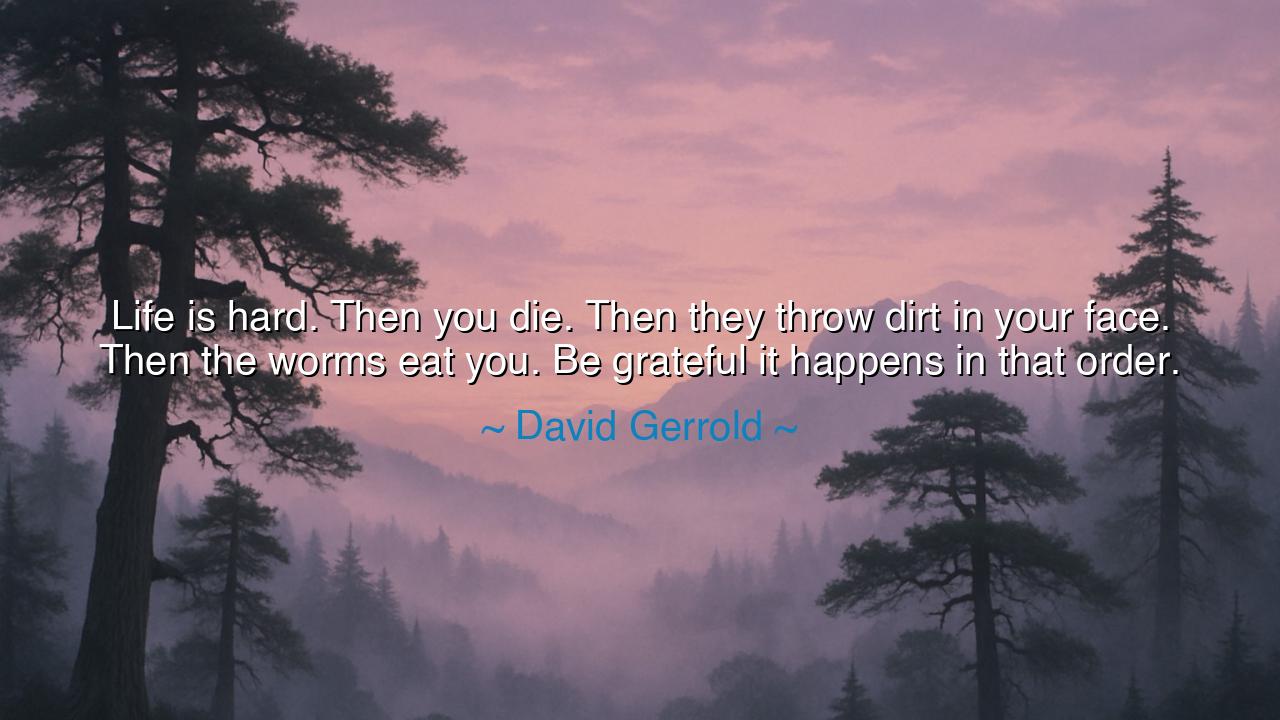
Life is hard. Then you die. Then they throw dirt in your face.
Life is hard. Then you die. Then they throw dirt in your face. Then the worms eat you. Be grateful it happens in that order.






“Life is hard. Then you die. Then they throw dirt in your face. Then the worms eat you. Be grateful it happens in that order.” Thus spoke David Gerrold, the storyteller of modern times, whose words, cloaked in dark humor, conceal a truth as old as humanity itself. At first, the saying seems grim—a jest about the cruelty of existence. Yet, when examined through the eyes of wisdom, it reveals not despair, but acceptance; not cynicism, but gratitude. For in these words lies an ancient truth: that to live is to suffer, to die is to rest, and that the proper order of things is itself a mercy.
Gerrold, the science fiction author best known for writing “The Trouble with Tribbles” in Star Trek, was a man who understood both the absurdity and the sanctity of life. His humor was never shallow—it was the laughter that comes after pain, the smile that follows understanding. When he said, “Be grateful it happens in that order,” he was reminding us of the natural rhythm of existence—that hardship, death, and decay are not punishments, but the steps of life’s inevitable cycle. He bids us to face these truths not with bitterness, but with a quiet and knowing courage. For to live is to toil and endure, but to die is to be freed from that toil—and for this, he urges us to be thankful.
The ancients, too, understood this truth. The Stoic philosophers of Greece and Rome spoke often of memento mori—“remember that you will die.” They did not utter it to breed fear, but to cultivate humility and strength. Marcus Aurelius wrote, “You could leave life right now. Let that determine what you do and say and think.” To the Stoics, the recognition of death gave meaning to labor and suffering, for it placed them in perspective. Gerrold’s words echo this same stoic wisdom, though with the sharp tongue of a modern sage: life is laborious, yes, but it follows a divine order; we are born, we strive, we perish—and then, as part of the great turning of the world, we nourish the soil from which new life springs.
Consider the story of Job from the ancient scriptures—a man stripped of wealth, family, and health, yet who refused to curse the divine order. “Shall we accept good from God, and not trouble?” he asked. Job’s endurance embodies Gerrold’s philosophy: he understood that life is hard, that death comes to all, but that there is meaning even in suffering. And though the worms may one day eat the flesh, they cannot devour the spirit that has lived with integrity. It is this understanding—that the body’s decay is part of nature’s design—that transforms Gerrold’s cynical humor into something radiant with wisdom.
Yet the quote is not meant to drown us in fatalism. Rather, it is a mirror, showing us how foolish it is to demand ease from life, or immortality from flesh. By saying, “Be grateful it happens in that order,” Gerrold is reminding us to see the blessing hidden in the sequence itself. Imagine if death came before life, or if the decay of the body preceded experience. The order of existence—first struggle, then stillness—reveals mercy. The hardness of life refines the soul; the certainty of death gives value to every breath. Even the worms, in their humble task, are not villains but renewers, returning us to the earth that birthed us. Thus, all things move in harmony, and gratitude becomes the only wise response.
Gerrold’s wisdom also whispers of resilience—of the strength to face difficulty with humor and grace. When he calls us to be “grateful,” he does not ask for naïve optimism, but for the courage to accept reality as it is, and to find dignity within it. To laugh at hardship is not to deny it, but to transcend it. The warrior, the poet, and the philosopher have all known this truth: laughter is the armor of the wise. When we accept the harshness of life and the certainty of death, we become unbreakable.
The meaning of Gerrold’s words, then, is this: life’s hardships are not curses but rites of passage. Death is not the enemy, but the fulfillment of a natural promise. The worms and the soil are not our undoing—they are the continuation of our story in another form. The true death, as the ancients would say, is not when the body falls to dust, but when the heart forgets to be thankful for the journey. To live well is to bear one’s burdens with grace, to accept the world’s order, and to smile even in struggle.
And so, the lesson, my listener, is this: be grateful for the order of things. Embrace the labor of life, for it gives shape to your soul. Accept death without fear, for it is the doorway to rest. Laugh often, for laughter is the mark of wisdom in a mortal being. Remember that even when the world throws dirt upon you—literally or figuratively—you will have already lived, and that is victory enough.
So remember the words of David Gerrold: “Life is hard. Then you die. Then they throw dirt in your face. Then the worms eat you. Be grateful it happens in that order.” For gratitude is the final rebellion of the human spirit—the laughter that confounds despair. In that laughter lies freedom, and in that freedom, a kind of immortality.






AAdministratorAdministrator
Welcome, honored guests. Please leave a comment, we will respond soon